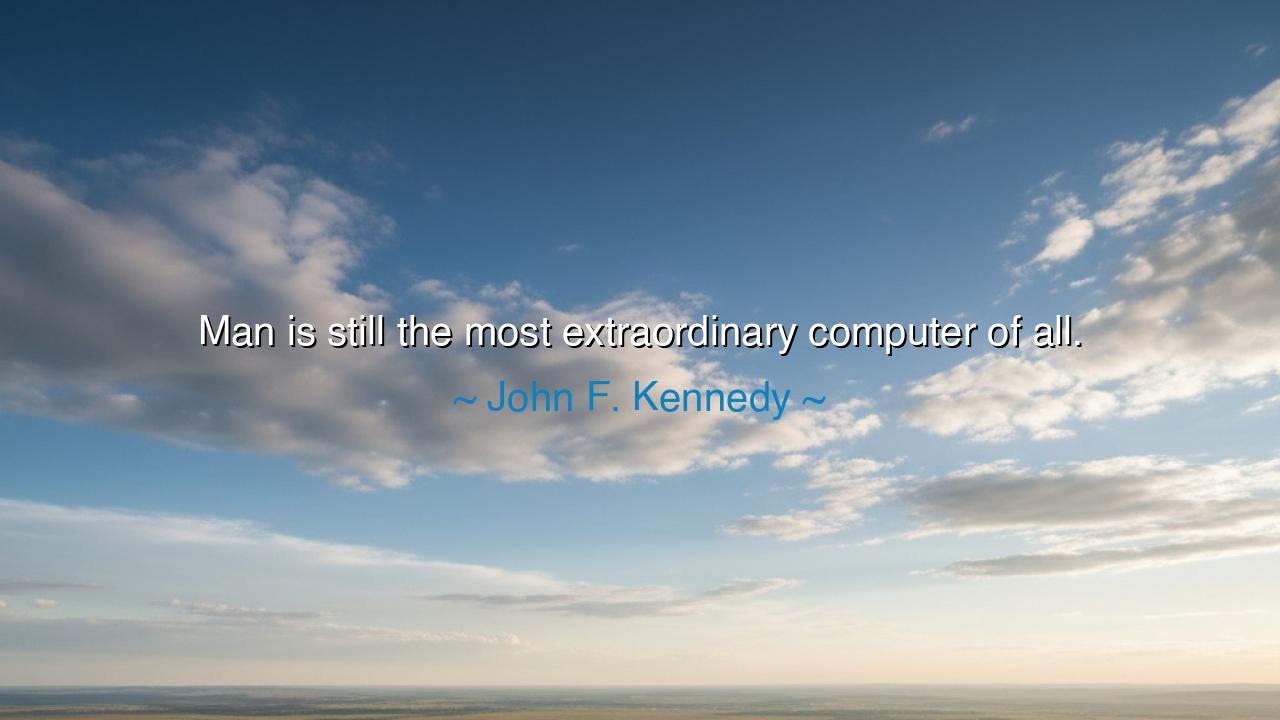
Man is still the most extraordinary computer of all.






John F. Kennedy’s words, “Man is still the most extraordinary computer of all,” resonate deeply with the wisdom of the ages. In an era when technology was advancing at an exponential rate and computers were becoming more capable of performing calculations and processing data, Kennedy’s statement was a reminder that, despite these machines' impressive abilities, there is something far greater in the human mind—its capacity for creativity, intuition, emotion, and complexity. While computers can store vast amounts of data and perform computations at incredible speed, humankind still possesses the ability to think deeply, to imagine the future, and to engage in actions driven by moral and spiritual conviction. In this statement, Kennedy not only praises the human mind but also asserts that the human spirit remains the most potent force in the universe.
The ancient philosophers understood the value of the human mind and the complexity of human thought long before machines existed. Socrates, in his dialogue with his disciples, spoke of the mind as something that must be nurtured, questioned, and refined through reason and self-reflection. He believed that through rigorous questioning, human beings could reach higher levels of understanding, thus living a more virtuous life. Just as Socrates would not have valued the sterile nature of mechanical thought over the depth of human consciousness, Kennedy's quote affirms that the human mind holds the potential for wisdom far beyond the capabilities of a machine. The computer may be fast and efficient, but it cannot reflect, create, or dream in the way a human being can.
Consider the example of Leonardo da Vinci, who was not only a master of the physical sciences but also of the human condition. Leonardo's mind was a microcosm of the universe itself—a combination of intellect and creativity that allowed him to conceptualize inventions long before the technology existed to bring them to life. His notebooks, filled with sketches and diagrams, were the result of a mind capable of blending science, art, and human experience in ways that no machine could ever replicate. The machine of Leonardo’s time, the most advanced technology available, could not have created the ideas that Leonardo himself envisioned. His human mind was the greatest computer of all, able to process the world through the lens of imagination, perception, and insight.
Moreover, as ancient wisdom teaches us, the human mind is not only about intellectual capability but also about emotional intelligence and the ability to feel. The Greek concept of ethos—the ability to understand and be moved by the emotions and struggles of others—cannot be programmed into a machine. Humans have the unique ability to experience empathy, love, compassion, and moral judgment, qualities that no computer or algorithm can truly replicate. For all the technological advances that might allow a machine to calculate, it cannot understand suffering, joy, or the nuances of human relationships. In this way, the human mind surpasses the computer by its very nature—reason alone is insufficient for understanding the depths of life.
Think of Nelson Mandela, whose wisdom and moral vision shaped the future of South Africa. His ability to move past personal suffering and create a nation of reconciliation was rooted in his profound understanding of human nature and his capacity to empathize with the pain of others. Mandela’s human mind was not just an intellectual processor; it was a consciousness capable of forgiving, dreaming, and leading in ways that no machine could ever achieve. His leadership was not born of calculation or efficiency, but of a deep understanding of human struggle and the strength to overcome it. In Mandela, we see the true power of the human spirit, a force that no computer can match.
While computers have undeniably changed the world, enabling advances in medicine, communication, and industry, Kennedy’s words are a reminder that the human mind is not to be outdone. The computer’s cold logic is limited by its inability to recognize the complexities of life. It lacks the creative spark that propels humans to invent, to dream, and to solve problems with empathy. The true danger that Kennedy speaks of is not the rise of the machines, but the potential loss of the human essence—our ability to think critically, to feel deeply, and to act with moral conviction. As we continue to advance technologically, we must ensure that our minds—our capacity for imagination, creativity, and wisdom—remain central to the journey.
Lesson for the ages:
While machines may be efficient and powerful, they cannot replace the depth of the human mind. It is our creativity, our intuition, and our capacity for empathy that make us truly extraordinary. The human mind, like the great thinkers of the ancient world, is not bound by the limitations of logic or efficiency, but is capable of wisdom, vision, and love. As we navigate the challenges of the future, let us remember that true power lies not in our ability to compute but in our ability to feel, reflect, and create with purpose.
Practical Action:
In your own life, cultivate the strength of the human mind by embracing both logic and emotion. Technology is a tool—use it wisely, but never let it replace the depth of your own thoughts, the complexity of your emotions, or the wisdom that arises from experience. Trust your intuition as much as your reason, and remember that the true measure of progress is not in how efficiently we can solve problems, but in how compassionately we approach them. Never forget that your human mind—with its capacity to dream, feel, and create—is the most powerful force in the world.






AAdministratorAdministrator
Welcome, honored guests. Please leave a comment, we will respond soon